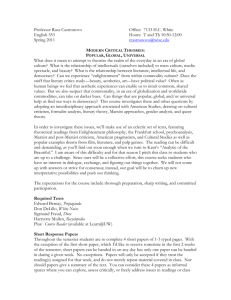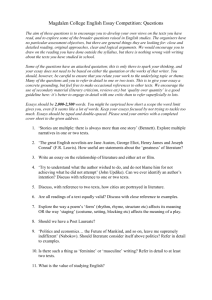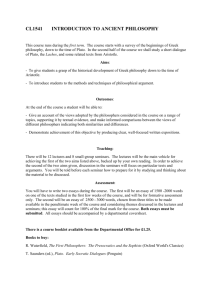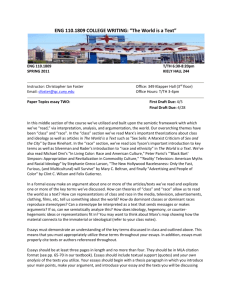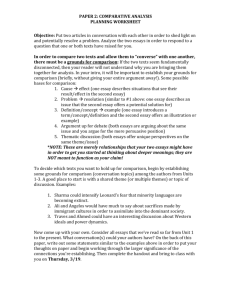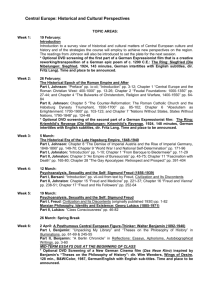syllabus
advertisement
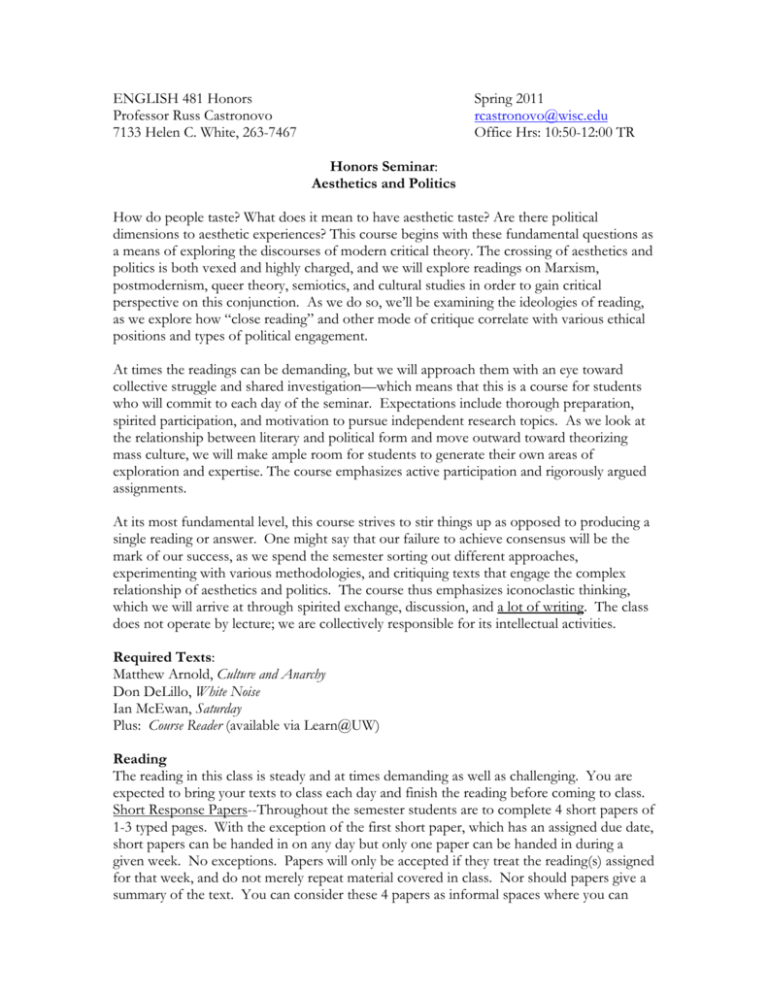
ENGLISH 481 Honors Professor Russ Castronovo 7133 Helen C. White, 263-7467 Spring 2011 rcastronovo@wisc.edu Office Hrs: 10:50-12:00 TR Honors Seminar: Aesthetics and Politics How do people taste? What does it mean to have aesthetic taste? Are there political dimensions to aesthetic experiences? This course begins with these fundamental questions as a means of exploring the discourses of modern critical theory. The crossing of aesthetics and politics is both vexed and highly charged, and we will explore readings on Marxism, postmodernism, queer theory, semiotics, and cultural studies in order to gain critical perspective on this conjunction. As we do so, we’ll be examining the ideologies of reading, as we explore how “close reading” and other mode of critique correlate with various ethical positions and types of political engagement. At times the readings can be demanding, but we will approach them with an eye toward collective struggle and shared investigation—which means that this is a course for students who will commit to each day of the seminar. Expectations include thorough preparation, spirited participation, and motivation to pursue independent research topics. As we look at the relationship between literary and political form and move outward toward theorizing mass culture, we will make ample room for students to generate their own areas of exploration and expertise. The course emphasizes active participation and rigorously argued assignments. At its most fundamental level, this course strives to stir things up as opposed to producing a single reading or answer. One might say that our failure to achieve consensus will be the mark of our success, as we spend the semester sorting out different approaches, experimenting with various methodologies, and critiquing texts that engage the complex relationship of aesthetics and politics. The course thus emphasizes iconoclastic thinking, which we will arrive at through spirited exchange, discussion, and a lot of writing. The class does not operate by lecture; we are collectively responsible for its intellectual activities. Required Texts: Matthew Arnold, Culture and Anarchy Don DeLillo, White Noise Ian McEwan, Saturday Plus: Course Reader (available via Learn@UW) Reading The reading in this class is steady and at times demanding as well as challenging. You are expected to bring your texts to class each day and finish the reading before coming to class. Short Response Papers--Throughout the semester students are to complete 4 short papers of 1-3 typed pages. With the exception of the first short paper, which has an assigned due date, short papers can be handed in on any day but only one paper can be handed in during a given week. No exceptions. Papers will only be accepted if they treat the reading(s) assigned for that week, and do not merely repeat material covered in class. Nor should papers give a summary of the text. You can consider these 4 papers as informal spaces where you can explore, assess critically, or freely address issues in readings or class discussions. Use them as an incubator for longer essays or simply as a space to present reactions, musings, questions, disappointments, etc. about the readings or the ways in which we have—or have not—been talking about the texts in our class discussions. However you proceed, close critical examination of the text (a sentence, an image) is the only beginning to insightful thinking. Think of these short papers as “thought experiments” for generating compelling ideas. Definitive conclusions are not the goal of these short papers. Instead, you might treat these short papers as initial drafts or meditations for the longer, more important essays. The short papers can be handed in any week, but the decision is yours to choose which 4 to complete. E-Discussion Paragraphs On a few occasions this semester, you will be asked to submit via email a paragraph that assesses some aspect of the next class’s reading. What I suggest is a series of questions, contestations, or provocations that problematizes the reading in ways that will lead to an informed, lively, and intelligent class discussion. In order to give your colleagues an opportunity to prepare, it is essential that you email copies of your paragraph at least 24 hours prior to our class meeting. Under no conditions, will late responses receive credit. Please note: since several of you will be submitting these e-paragraphs for any given class, it is fine for you to work collaboratively. Essays There are two essays for this course, a midterm essay of 5-7 pages and a final essay of 7-9 pages. Keep a copy of your work until it has been returned. Papers are graded on the quality of ideas, coherence of thesis and argument, textual support for the argument, and originality. No paper that is sloppily written will receive a higher grade for content than it would receive for the quality of its prose. You are expected to proofread your work. Papers are due on the dates indicated with one exception. If at any time prior to the due date you bring a typed draft of at least 2 pages, then I will give you an extension. The intent is to encourage you to revise your argument and writing. I'm willing to work with you at every stage (brainstorming, ideas, sentence structure, argumentation, interpretation, revision) to develop excellent essays. Please note that the final essay will be preceded by a prospectus to be presented to the group as a whole. Attendance Mandatory. You are expected to attend all class meetings. Attendance is taken at the start of class. Each of you brings a different—and equally important—perspective to the material. You owe it to yourselves and to each other, more so than to me, to attend each class. Every absence affects your participation grade. More than three unexcused absences will result in a failing grade for the course. If you know you cannot make class for any reason, you must notify me in advance, so that I can plan class accordingly. Participation This is a crucial element of this course. Students are encouraged to take an active part in class meetings. Come prepared with questions, comments, insights, criticisms, and observations. Many different voices circulate through the texts we'll be reading, and to best understand these writings, we need many different voices to circulate (in harmony and contention, clarity and puzzlement) through our classroom. Academic Integrity I encourage you to meet with your classmates outside of class to discuss the reading assignments, bounce paper ideas off each other, read drafts, and prepare for exams. Collaborative learning is a powerful tool. I do expect, however, that all the written work you do for me in this course will be your own. As you may already know, there are an increasing number of Internet sites for doing research. If you use information or ideas you have found electronically, be sure to document and attribute your sources properly. If you have questions regarding the documentation of sources—electronic or otherwise—please do not hesitate to see me. I take seriously the University’s regulations encouraging academic integrity. Participation Short Papers and E-paragraphs Midterm Essay Final Essay 9/3 15% 20% 25% 40% Introduction 9/5 Immanuel Kant, “Analytic of the Beautiful” (from The Critique of Judgment) First short paper due 9/10 Kant, “Analytic of the Beautiful”; William Carlos Williams, “Portrait of a Lady” 9/12 Matthew Arnold, Culture and Anarchy 9/17 Culture and Anarchy; Arnold, “The Function of Criticism at the Present Time” 9/19 Karl Marx, “The German Ideology”; Gil Scott Heron, “The Revolution Will Not Be Televised” 9/24 Marx, “The German Ideology”; Siegfried Kracauer, “The Mass Ornament” 9/26 Ian McEwan, Saturday 10/1 Saturday; Matthew Arnold, “Dover Beach” 10/3 Walter Benjamin, “The Authors as Producer” 10/8 Walter Benjamin, “The Work of Art in the Age of Mechanical Reproduction” 10/10 Jean-Paul Sartre, What Is Literature? 10/15 Theodor Adorno, “Commitment”; Carolyn Forché, “The Colonel” 10/17 Theodor Adorno, “”Freudian Theory and the Pattern of Fascist Propaganda” Bring Your Favorite Piece of Propaganda to School 10/22 Theodor Adorno and Max Horkheimer, “The Culture Industry” 10/24 Fredric Jameson, “Reification and Utopia in Mass Culture” 10/29 Frederic Jameson, “Postmodernism, or the Logic of Late Capitalism” 10/31 Don DeLillo, White Noise 11/5 White Noise 11/7 White Noise; Rem Koolhaus, “Junkspace” 11/12 Eve Sedgwick, “Paranoid Reading and Reparative Reading” 11/14 Michael Warner, “Uncritical Reading” 11/19 Edgar Allan Poe, “The Purloined Letter” 11/21 Stephen Best and Sharon Marcus, “Surface Reading”; Anne Anlin Cheng, “Skin, Tattoos, and Susceptibility” 11/26 Rita Felski, The Uses of Literature or Lauren Berlant and Michael Warner, “Sex in Public” [class decision] 11/28 Thanksgiving 12/3 Prospectus Day 12/5 Bruno Latour, “Why Has Critique Run out of Steam? From Matters of Fact to Matters of Concern” 12/10 Immanuel Kant, “What Is Enlightenment” 12/13 Wrap Up




